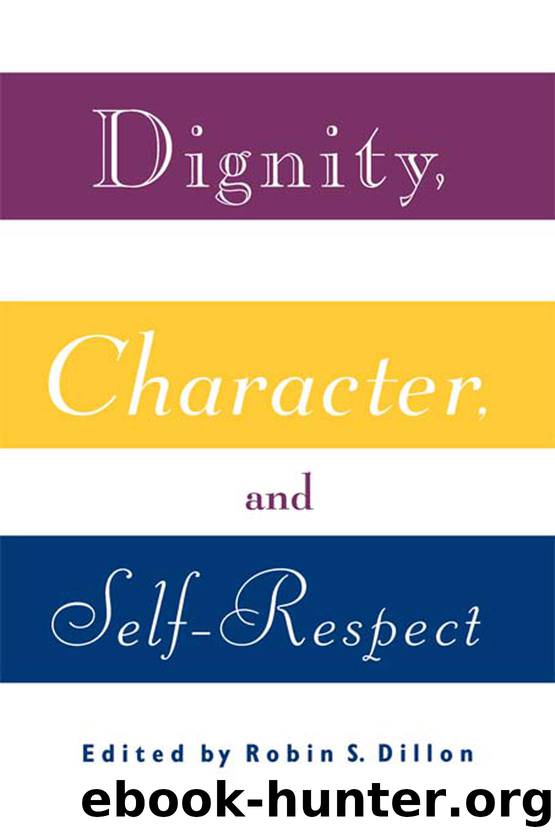Dignity, Character and Self-Respect by Robin S. Dillon

Author:Robin S. Dillon
Language: eng
Format: azw3
Publisher: Taylor and Francis
Published: 2013-01-10T16:00:00+00:00
II. Integrity and Self-Respect
The thoughts which are constitutive of the emotions of self-assessment are directed towards the self and its status. A person, to be able to experience these emotions, needs a form of self-consciousness which is not just the capacity to ascribe experiences to himself, though this is of course a minimum requirement. The person concerned must be capable of being self-conscious also in the sense that he can see himself as a being that can be seen by others, that can be assessed and judged.
If there is self-consciousness there is a self to be conscious of. This does not imply that there is one unchanging entity, the self, which is the object of such consciousness. The self is not unchanging, and it cannot be the object of consciousness in the way in which a physical object or event can be an object of consciousness. The “perceiver” is part of that self and so contributes to what it is. He can affect and shape what he perceives as the observer of the physical event cannot affect and shape what he perceives.
The person capable of experiencing the emotions of self-assessment sees himself from the point of view of being an agent in the world, who tries and succeeds or fails to bring about certain states of affairs; he sees himself as affected by others, and he takes a view of his own effectiveness and the value of what he has achieved. He sees himself as a moral agent, at least in the minimal sense that he thinks about himself and his life evaluatively. As such an agent he has an identity. Necessarily, the identity of the moral agent depends on other criteria for self-identity being fulfilled; in particular, for it to be possible for an agent to assess himself, there must be a degree of connectedness between his states of consciousness. But the dependence is one way only: a being's identity as moral agent may be lost without this affecting any identity he may have in mental or physical terms.8 The problem concerning the identity of a moral agent is not how to re-identify the same individual in different situations; this point is assumed to be settled. It is rather the question of what identifies the person as essentially the person he is. For what he thinks very worthwhile doing, and what he thinks very important not to do, contributes essentially to his being one sort of person rather than another. Whether or not a moral agent preserves his identity depends on whether or not he possesses integrity.
The person of integrity is sometimes seen as the person who possesses certain moral virtues. Most obviously, she will be honest in various ways: she does not systematically deceive, she does not cheat or break her word. She will, it seems, possess those virtues which may be labelled “forms of conscientiousness,” viz., honesty, fairness, truthfulness, and being a person of one's word.9 But there is also what seems to be quite a different
Download
This site does not store any files on its server. We only index and link to content provided by other sites. Please contact the content providers to delete copyright contents if any and email us, we'll remove relevant links or contents immediately.
| Anthropology | Archaeology |
| Philosophy | Politics & Government |
| Social Sciences | Sociology |
| Women's Studies |
The remains of the day by Kazuo Ishiguro(8961)
Tools of Titans by Timothy Ferriss(8357)
Giovanni's Room by James Baldwin(7313)
The Black Swan by Nassim Nicholas Taleb(7097)
Inner Engineering: A Yogi's Guide to Joy by Sadhguru(6780)
The Way of Zen by Alan W. Watts(6589)
Asking the Right Questions: A Guide to Critical Thinking by M. Neil Browne & Stuart M. Keeley(5747)
The Power of Now: A Guide to Spiritual Enlightenment by Eckhart Tolle(5740)
The Six Wives Of Henry VIII (WOMEN IN HISTORY) by Fraser Antonia(5493)
Astrophysics for People in a Hurry by Neil DeGrasse Tyson(5172)
Housekeeping by Marilynne Robinson(4430)
12 Rules for Life by Jordan B. Peterson(4298)
Double Down (Diary of a Wimpy Kid Book 11) by Jeff Kinney(4257)
The Ethical Slut by Janet W. Hardy(4235)
Skin in the Game by Nassim Nicholas Taleb(4231)
Ikigai by Héctor García & Francesc Miralles(4228)
The Art of Happiness by The Dalai Lama(4118)
Skin in the Game: Hidden Asymmetries in Daily Life by Nassim Nicholas Taleb(3985)
Walking by Henry David Thoreau(3948)
